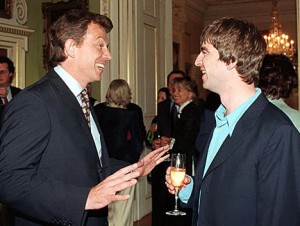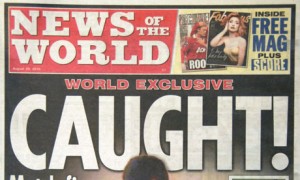
A gradual but inevitable descent into cricket-based loathing and bile.
One Of The Great What Ifs, #2: Graeme Hick Didn’t Get Shafted By Mike Atherton
Despite his squeaky clean image, Michael Atherton has a fair few skeletons in his cupboard. There was the ‘dirt in the pocket’ affair for a start, the photos of him all chummy with Robert Mugabe, plus the time he left Graeme Hick stranded on 98* at the SCG, declaring an over earlier than had apparently been promised. Hick’s runs had come from 166 balls, exactly the same number as faced by Atherton in the same innings. And how many runs had the captain himself made? Just 67, a damning statistic if ever there was one.
But what if he hadn’t been quite such a git and had allowed Hick to bat on to three figures? We consulted the 51allout crystal ball for a view on the future that never was (actually, we say crystal ball, but it’s basically a cheap globe thing that we had left over from our Labyrinth phase, when we briefly failed to master contact juggling).
After Hick reached his hundred in Sydney back in 1994, the third Test ended in a draw, despite Australia’s wobble on the final day, a result that also ensured Australia retained the Ashes. Hick’s prolapsed disc kept him out of the final two games of the series, with England winning in Adelaide and losing in Perth, but it was clear that his confidence had been massively boosted by his third Test hundred, his first against Australia.
The following English summer saw the arrival of the West Indies, the side that had caused so many problems for Hick during his debut series four years previously. This time he wasn’t to be intimidated, taking on the short ball in almost cavalier fashion. Sadly his scores of 73* and 82* were lone stands as Brian Lara inspired his side to a comfortable win at Headingley but at Lord’s it was a different story, Hick making 13 and 67 before Dominic Cork stole the headlines, and the win, with a seven wicket haul.
The third Test at Edgbaston became infamous for the quality (or lack thereof) of the pitch. As England crumbled to an innings defeat inside three days, Hick’s brave second-innings 66* stood out as a beacon of hope. He then followed that up with a superb 142 (plus the prized wicket of Brian Lara) as the home side squared the series at Old Trafford.
From this point on there was no stopping Hick. He completely dominated the fifth Test at Trent Bridge, making 118* and a glorious run-a-ball 88 as England set up a declaration, the game ending in a draw as the West Indies clung on. But then came his magnum opus at The Oval, an unbeaten 235* followed up by four wickets on a turning pitch as England claimed the series win at the last.
Hick’s astonishing efforts – 887 runs at an average of 177 – were proof that, four years later than expected, he had finally arrived. The plunderer of runs at county level was now a plunderer of runs at the very top level. Another 500 runs followed in a drawn series in South Africa, with Hick’s unbeaten 72 in partnership with great friend Michael Atherton (185*) key to staving off defeat in Johannesburg.
By the time India arrived in the summer of 1996 Hick was flying, reaching a double hundred at Lord’s just as news filtered through of England’s penalty shoot out win over Spain in Euro 96. It was party time in the UK. Now ranked the world’s number one Test batsman, the man from Zimbabwe became a household name, a symbol of all that was good about modern British culture. A picture of him in the Wembley rafters, sat alongside David Baddiel and Frank Skinner, holding his head in his hands after Gareth Southgate’s penalty miss, was in every newspaper the following day.
That was followed up by a well-received appearance on TFI Friday where Hick found himself moving in new circles. Just a few weeks later he was introducing the Sex Pistols as part of their reunion tour before being seen drinking in the VIP box with the likes of Noel and Liam Gallagher.

Tony Blair, Noel Gallagher and a just out of shot Graeme Hick discuss the best way to play the short ball.
While the drinks began to flow, the runs did too. Pakistan were put to the sword – Hick frustratingly run out on 299 at Headingley – before a triumphant return to Zimbabwe saw England win both Tests in style (“he flippin’ murdered them”, said coach David Lloyd of Hick’s performance). Another comfortable series win, this time in New Zealand, led into the 1997 Ashes, where England fans finally believed that they could regain the urn after eight long years.
That belief grew even stronger as England won the first Test at Edgbaston despite Hick’s absence with what was described as ‘a minor muscle injury’. They also fortuitously drew the second, despite being bowled out for just 77, thanks to the weather. Hick was again surprisingly absent, this time with a bad case of the flu.
When Hick finally returned to the side for the third Test, pundits and viewers alike were shocked by his appearance. He was pale, gaunt and fragile, with red eyes hidden behind sunglasses, even in the darkness of the Manchester summer. He looked fidgety at the crease, struggling his way to scores of just 3 and 11 as England were crushed. To add insult to injury, Hick dropped three catches at slip, each more simple than the last.
By the time England announced their side for the fourth Test of the summer, speculation was running wild. When Hick’s name was excluded (officially due to ‘a toe injury’) that speculation increased tenfold. Where was Graeme Hick? What had happened to England’s best player?
The truth finally emerged four days later, with the News Of The World exclusively revealing that Hick was in The Priory, undergoing rehabilitation foran addiction to various drugs and alcohol. He was never to play international cricket again.
When Hick finally reappeared to play county cricket for Worcestershire in the summer of 1999, he was a changed man. The confidence at the crease was gone. There would be glimpses of the past in a glorious cover drive, the words ‘Duncan Fearnley’ displayed for all and sundry to see, but it would inevitably be followed by a loose shot. Then the head would bow and Hick would solemnly walk away to a smattering of almost apologetic applause, as if the crowd were cheering the past rather than the present.
Hick retired after the 2000 season, leaving England and its ever-present paparazzi culture to retreat to Zimbabwe where he tried (and failed) to run for government. He has not been seen publicly since 2006.




6 Comments
Post a Comment
1
Nichael Bluth
12 Nov 2014 02:13
I don’t think we could lecture anyone about rambling on, when we’ve been doing exactly that for years now. Do you want to write some articles for us?
2
Craig
11 Nov 2014 22:35
Apologies for rambling on. Please feel free to delete.
3
Nichael Bluth
11 Nov 2014 02:33
I don’t think Hick is the only one to have suffered an horrific head injury.
4
Craig
11 Nov 2014 01:19
Wonderful, wonderful stuff!
This plays out exactly as I’d imagined it until the ’97 Ashes. No way would he dabble in the foul world of drink ‘n drugs though, nuh uh – If I may please allow me to indulge a little of my Hicky fantasies and offer an alternate, alternate timeline!:
Hicky misses the first 5 ’97 Ashes Tests due to muscle injuries but bravely comes back at the Oval. A duck in the 1st innings, and a thigh strain, forcing him to need a runner, doesn’t stop him in the 2nd inns bravely adding 112 runs for the last wicket with Phil Tufnell, Hicky scoring 92 of them in his 130*, which gives England just enough runs to play with. He and Tufnell then run through the aussies, sharing all ten wickets in an epic win.
Atherton dismayed by another Ashes failure stands down as Captain, recommending Hick to be his successor. To unanimous acclaim Hick is granted the role in both formats. He leads an experimental squad to victory in Sharjah, securing the trophy with a match-winning 6 in the Final.
Hick proclaims before the tour to the West Indies that he has a score to settle there, and his England team will right the wrongs of many past thrashings.
Hick, and England, live up to their words, beating the Windies 4-0. Angus Fraser taking 40 wickets in the series, and Hick top-scoring with 623 runs despite missing the 2nd Test due to an horrific head injury picked up in the ill-
fated,abandoned Sabina Test, where he was struck on the helmet by Ambrose after hitting 41 runs off 20 balls.
The Wisden Trophy secured, Hick states that he intends to build English cricket into ‘a bastion of invincibility’ echoing the words of Bill Shankly, legendary manager of Hick’s beloved Liverpool.
An easy start to the ’98 summer ensued as South Africa were whitewashed in the Texaco ODI series: Hick’s county teammate David Leatherdale making his international debut.
The First Test at Egbaston was a rain-affected draw, brightened mostly by a breezy partnership of 160 between Hick and Ramprakash in the 1st innings, at a run rate of almost 5 an over.
The 2nd Test at Lords was a shock to the system to all, none more so that Hick, who, engaging in an ego battle with Alan Donald, perishes twice cheaply hooking to long leg, and England slipping to a heavy defeat.
Another under par performance in the 3rd Test (23 & 5) leaves Hick thankful for Fraser & Croft’s rescue act. Hick,increasingly being drawn into sledging battles with the South Africans, with one notable exchange between him and Cronje, where lip-reading experts heard Hick tell the the South African to ‘stick his leather jacket where the sun don’t shine’.
A recall for Robin Smith (replacing the injured Thorpe) stabilises England’s batting and they sweep to a 7-wicket victory. An amusing incident towards the end of the match as Hick hits 4s off the last two balls, winning the Test but leaving Atherton stranded on 98*.Hick later declared he was sorry for Atherton, but he was finding Donald so easy to face he couldn’t resist the big hits.
The summer is won with a brutal win in the 5th Test, Hick’s 96 & 123 adding to all-round excellent England batting, allowing him to declare and set South Africa 537 to win. The recalled Devon Malcolm sweeps through the batting, taking the first 9 wickets until Gough takes the edge of Donald……which Hick ”drops”. Malcolm takes the edge of Ntini in the next over and Hick takes the catch to win the series. The fans rush onto the pitch lifting each England player aloft off the pitch.
With microphone in hand, Hick booms that the Ashes will be brought back home from ‘them’ in the winter, lifting his arms in an apparent ‘shackle’ gesture, and he and the rest of the team start joining in with the crowd in a chorus of ‘Three Lions’…….
It’s past 1am, and I can’t write anymore! Please forgive me for filling up your comments page with my badly-written prose, but your piece reminded me just how badly I wanted Hick to succeed when I was younger and inspired me a little.
Thanks again for the this piece.
5
Nichael Bluth
22 Sep 2013 04:13
Thanks for the suggestion. And no, my name isn’t really Nichael – I’m the one in the podcast who isn’t James or Matt…
6
Alex G
21 Sep 2013 14:11
This is possibly my favourite thing ever written on the internet. Thank you.
P.S. Is your name really Nichael?